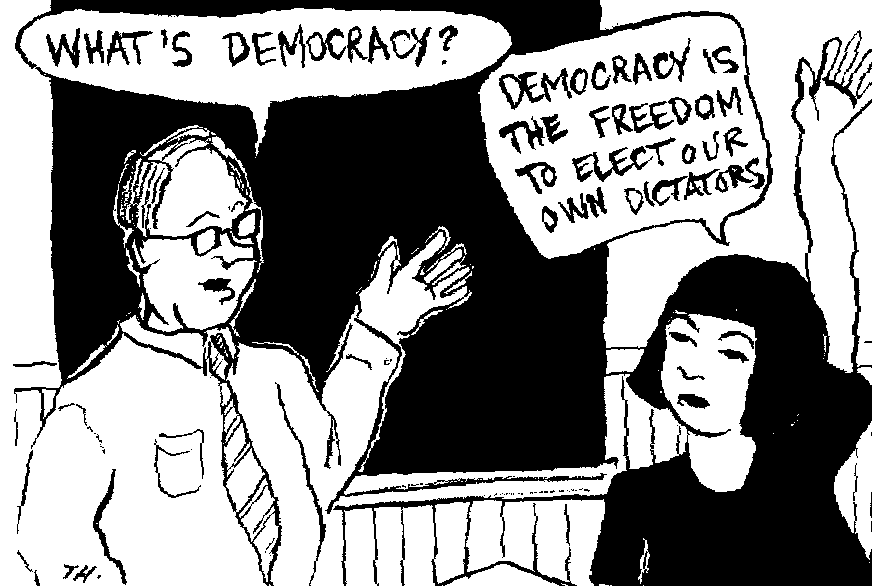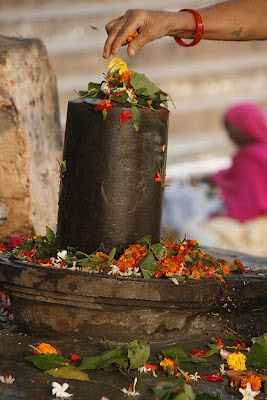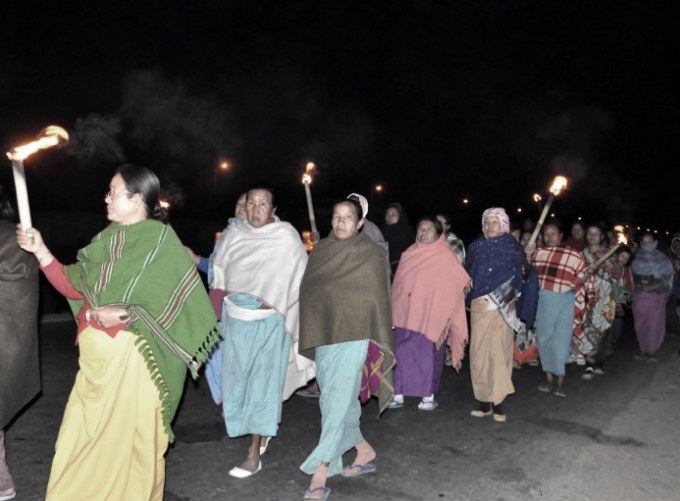The Bhopal Gas Tragedy Shows the True Colour of the Indian Democracy
 |
| Image by Illuminati News |
A collection of newspaper clippings and press releases from across the mainland on the Bhopal gas tragedy, which shows the true colour of the Indian democracy
(Excuse the draconian laws like the Armed Forces Special Powers Act for some time)
Sources:
Sources:
June 20: At midnight on December 2, 1984, Bhopal became a living manifestation of disastrous corporate negligence leading to the death of over 20,000 people and causing injuries to over 5 lakh, according to official and unofficial figures combined.
After a gap of generation and twenty-five years – on June 7 2010 – the City Judicial Magistrate passed the verdict in the 'Union of India through CBI versus Keshub Mahindra* and others' case. [* Keshub Mahindra is now chairman of the automobile giant Mahindra and Mahindra.]
The onus is on the flawed judicial system of the country. The court took this long to convict the seven accused to a paltry two-year sentence and till now, Warren Anderson – the former chairman and CEO of Union Carbide India Ltd – is absconding.
"The verdict is a textbook case of studying all that ails the Indian judicial system," according to the Asian Human Rights Commission (ARC). "It is a classic case proving the oft-cited aphorism of justice delayed is justice denied. Further, the whole trial and the hearing is a classic case of how the prosecution sides with the guilty instead of helping the victims."
In a rare admission of the failings of the Indian legal system, Law Minister Veerappa Moily did utter the case highlighted the need to revisit the law pertaining to industrial disasters and for fast-track courts to deal with such cases.
The AHRC added, "This verdict points towards the absolute failure of the rule of law and the consequent prevalence of the culture of impunity in India. Bhopal is another reminder for those who believe that India is a functioning democracy with adherence to the rule of law in general despite having often reported cases from those areas where the Armed Forces (Special Powers) Act, 1958 (AFSPA) prevails over the accepted norms of justice! What is the difference if a perpetrator of crime can get away after killing people either in Manipur, a troubled area by Indian government's own admissions or in Bhopal a city within the largely 'peaceful mainland' India?
"Rather, one can find a lot of similarities in the ways the criminal investigation and justice systems operate in both these areas. In Manipur, Jammu and Kashmir and other 'disturbed' areas of India, the state itself encourages the Army and paramilitary units to engage in violations and abuse of democratic rights of the people in the name of maintaining law and order. In these areas it not only tolerates but also actively promotes undemocratic methods of quelling dissent by means of extrajudicial executions and torture; by stalling any criminal investigation into the conduct of guilty officers by providing them impunity by draconian laws like the AFSPA. The point that these laws are bad in both letter and the spirit does not even require mentioning.
"The only thing that changes in the Bhopal case is the modus operandi. Instead of supporting the criminals proactively the state helped them with acts of omission than commission. So it would let Warren Anderson slip out of the country merely four days after the tragedy on a bail knowing fully well that he would be most unlikely to return. Then the CBI, the prosecuting agency would take full four years just for filing a charge-sheet which it did in December 1987. It would let the accused, the powerful and mighty as the representative of the international capital, use all the delaying tactics including going to the Supreme Court asking relief for the fact that charges against them were harsher than justified.
"The verdict proves, almost conclusively, that India is a failing, if not already failed state. That far from being the biggest democracy of the world, it, in fact, is nothing more than a banana republic. That it is a country where murderers of ordinary citizen, whether in Manipur or Madhya Pradesh, can go scot free.
It is a state that will protect the interests of the corporations at the cost of the common man it pledges allegiance to and that it will sell its dead real cheap, around US$ 249 to be precise.
One paper described the two-year sentences given to eight former Union Carbide executives as "absurdly light punishment" and "a travesty of justice". Several accused successive Indian governments of kowtowing to US business interests in their failure to bring the former Union Carbide head, Warren Anderson, to justice.
After a gap of generation and twenty-five years – on June 7 2010 – the City Judicial Magistrate passed the verdict in the 'Union of India through CBI versus Keshub Mahindra* and others' case. [* Keshub Mahindra is now chairman of the automobile giant Mahindra and Mahindra.]
The onus is on the flawed judicial system of the country. The court took this long to convict the seven accused to a paltry two-year sentence and till now, Warren Anderson – the former chairman and CEO of Union Carbide India Ltd – is absconding.
"The verdict is a textbook case of studying all that ails the Indian judicial system," according to the Asian Human Rights Commission (ARC). "It is a classic case proving the oft-cited aphorism of justice delayed is justice denied. Further, the whole trial and the hearing is a classic case of how the prosecution sides with the guilty instead of helping the victims."
In a rare admission of the failings of the Indian legal system, Law Minister Veerappa Moily did utter the case highlighted the need to revisit the law pertaining to industrial disasters and for fast-track courts to deal with such cases.
The AHRC added, "This verdict points towards the absolute failure of the rule of law and the consequent prevalence of the culture of impunity in India. Bhopal is another reminder for those who believe that India is a functioning democracy with adherence to the rule of law in general despite having often reported cases from those areas where the Armed Forces (Special Powers) Act, 1958 (AFSPA) prevails over the accepted norms of justice! What is the difference if a perpetrator of crime can get away after killing people either in Manipur, a troubled area by Indian government's own admissions or in Bhopal a city within the largely 'peaceful mainland' India?
"Rather, one can find a lot of similarities in the ways the criminal investigation and justice systems operate in both these areas. In Manipur, Jammu and Kashmir and other 'disturbed' areas of India, the state itself encourages the Army and paramilitary units to engage in violations and abuse of democratic rights of the people in the name of maintaining law and order. In these areas it not only tolerates but also actively promotes undemocratic methods of quelling dissent by means of extrajudicial executions and torture; by stalling any criminal investigation into the conduct of guilty officers by providing them impunity by draconian laws like the AFSPA. The point that these laws are bad in both letter and the spirit does not even require mentioning.
"The only thing that changes in the Bhopal case is the modus operandi. Instead of supporting the criminals proactively the state helped them with acts of omission than commission. So it would let Warren Anderson slip out of the country merely four days after the tragedy on a bail knowing fully well that he would be most unlikely to return. Then the CBI, the prosecuting agency would take full four years just for filing a charge-sheet which it did in December 1987. It would let the accused, the powerful and mighty as the representative of the international capital, use all the delaying tactics including going to the Supreme Court asking relief for the fact that charges against them were harsher than justified.
"The verdict proves, almost conclusively, that India is a failing, if not already failed state. That far from being the biggest democracy of the world, it, in fact, is nothing more than a banana republic. That it is a country where murderers of ordinary citizen, whether in Manipur or Madhya Pradesh, can go scot free.
It is a state that will protect the interests of the corporations at the cost of the common man it pledges allegiance to and that it will sell its dead real cheap, around US$ 249 to be precise.
One paper described the two-year sentences given to eight former Union Carbide executives as "absurdly light punishment" and "a travesty of justice". Several accused successive Indian governments of kowtowing to US business interests in their failure to bring the former Union Carbide head, Warren Anderson, to justice.
Many papers were also indignant at the levels of compensation awarded to victims of the disaster and their families.
It is a shameful indictment of our lethargic judiciary… This verdict is a travesty of justice… Clearly the charge does not reflect the enormity of the crime committed…. it is just a rap on the knuckles. As for Anderson, he has escaped even this absurdly light punishment. If justice has eluded the victims, this is because the governments of the US and India have colluded to protect the guilty, including Anderson… Successive governments have been eager to please US business corporations in order to attract more investment rather than pursue justice.
T H E A S I A N AGE, New Delhi
The scale of human suffering in the wake of the tragedy… appears quite like that of a chemical weapons strike by a terrorist outfit… New Delhi should honour the dead and the suffering even at this late stage and press Washington to use all available laws to send Mr Anderson to face trial in India.
T H E T I M E S O F I N D I A, Mumbai
Just two years in jail for the men who committed the worst crime against the people of this country. And this mockery of justice after such a long wait. Twenty six years after 40 tonnes of lethal gas seeped into the lungs of Bhopal, some 17,000 men and women are still waiting for the so-called compensation… In all these years, the poor victims have done everything they could to get justice and compensation… Today, they were denied justice. Today, they were told that they should be happy with the peanuts thrown at them by Union Carbide. Today, India proved once again that it doesn't care for its poor… Today, India proved that it doesn't really care for its people, particularly if they have been slaughtered by powerful people from the most powerful nation in the world. Instead of taking on America and fighting for justice for its poor, India is more than happy to sell its dead cheap.
H I N D U S T A N T I M E S, New Delhi
Two years in jail and bail of 25,000 rupees for the eight accused (one now deceased) in the Bhopal gas case will do nothing to lessen the poisonous atmosphere that has clouded the controversial tragedy for 25 long years…. [It] should have been an open-and-shut case of criminal and corporate liability. Yet, a quarter of a century down the line, all the victims have managed to get is 12,410 rupees each for the dead and for the survivors of a lifetime of disability and pain both for themselves and their progeny.
T H E T R I B U N E, Chandigarh
The nation is bound to be disappointed over Monday's ruling of a Bhopal court in the Union Carbide gas tragedy case which concerned the world's worst industrial disaster to date… The victims of the gas tragedy and the kith and kin of the deceased may have decided to knock on the doors of the Madhya Pradesh High Court. But they have a long battle ahead. Most of them have got only a measly compensation so far. While there is no escape from fighting for justice because the killer gas has hit the survivors in their genes, it may take many more years for the judiciary to pronounce the last word in the case.
T H E I N D I A N E X P R E S S, New Delhi
The people of Bhopal continue to suffer from the 1984 leak and its botched aftermath - if not actually physiologically, then in terms of the dark shadows that have undeservedly become attached to their city's reputation. The accident, after all, could have happened anywhere in this country. Yet it's Bhopal that is instantly associated with the idea of industrial accident.







Comments
Post a Comment